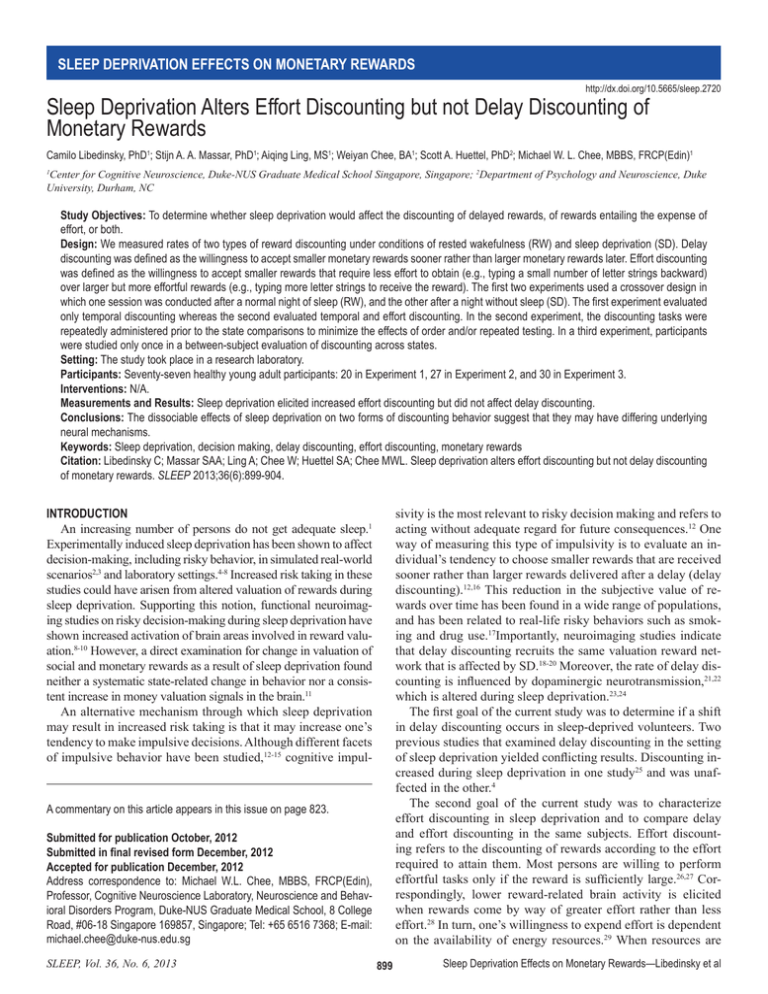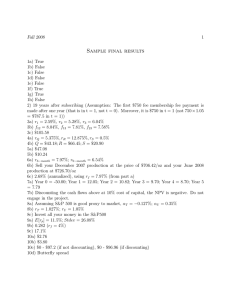Sleep Deprivation Alters Effort Discounting but not Delay
advertisement

SLEEP DEPRIVATION EFFECTS ON MONETARY REWARDS http://dx.doi.org/10.5665/sleep.2720 Sleep Deprivation Alters Effort Discounting but not Delay Discounting of Monetary Rewards Camilo Libedinsky, PhD1; Stijn A. A. Massar, PhD1; Aiqing Ling, MS1; Weiyan Chee, BA1; Scott A. Huettel, PhD2; Michael W. L. Chee, MBBS, FRCP(Edin)1 1 Center for Cognitive Neuroscience, Duke-NUS Graduate Medical School Singapore, Singapore; 2Department of Psychology and Neuroscience, Duke University, Durham, NC Study Objectives: To determine whether sleep deprivation would affect the discounting of delayed rewards, of rewards entailing the expense of effort, or both. Design: We measured rates of two types of reward discounting under conditions of rested wakefulness (RW) and sleep deprivation (SD). Delay discounting was defined as the willingness to accept smaller monetary rewards sooner rather than larger monetary rewards later. Effort discounting was defined as the willingness to accept smaller rewards that require less effort to obtain (e.g., typing a small number of letter strings backward) over larger but more effortful rewards (e.g., typing more letter strings to receive the reward). The first two experiments used a crossover design in which one session was conducted after a normal night of sleep (RW), and the other after a night without sleep (SD). The first experiment evaluated only temporal discounting whereas the second evaluated temporal and effort discounting. In the second experiment, the discounting tasks were repeatedly administered prior to the state comparisons to minimize the effects of order and/or repeated testing. In a third experiment, participants were studied only once in a between-subject evaluation of discounting across states. Setting: The study took place in a research laboratory. Participants: Seventy-seven healthy young adult participants: 20 in Experiment 1, 27 in Experiment 2, and 30 in Experiment 3. Interventions: N/A. Measurements and Results: Sleep deprivation elicited increased effort discounting but did not affect delay discounting. Conclusions: The dissociable effects of sleep deprivation on two forms of discounting behavior suggest that they may have differing underlying neural mechanisms. Keywords: Sleep deprivation, decision making, delay discounting, effort discounting, monetary rewards Citation: Libedinsky C; Massar SAA; Ling A; Chee W; Huettel SA; Chee MWL. Sleep deprivation alters effort discounting but not delay discounting of monetary rewards. SLEEP 2013;36(6):899-904. INTRODUCTION An increasing number of persons do not get adequate sleep.1 Experimentally induced sleep deprivation has been shown to affect decision-making, including risky behavior, in simulated real-world scenarios2,3 and laboratory settings.4-8 Increased risk taking in these studies could have arisen from altered valuation of rewards during sleep deprivation. Supporting this notion, functional neuroimaging studies on risky decision-making during sleep deprivation have shown increased activation of brain areas involved in reward valuation.8-10 However, a direct examination for change in valuation of social and monetary rewards as a result of sleep deprivation found neither a systematic state-related change in behavior nor a consistent increase in money valuation signals in the brain.11 An alternative mechanism through which sleep deprivation may result in increased risk taking is that it may increase one’s tendency to make impulsive decisions. Although different facets of impulsive behavior have been studied,12-15 cognitive impul- sivity is the most relevant to risky decision making and refers to acting without adequate regard for future consequences.12 One way of measuring this type of impulsivity is to evaluate an individual’s tendency to choose smaller rewards that are received sooner rather than larger rewards delivered after a delay (delay discounting).12,16 This reduction in the subjective value of rewards over time has been found in a wide range of populations, and has been related to real-life risky behaviors such as smoking and drug use.17Importantly, neuroimaging studies indicate that delay discounting recruits the same valuation reward network that is affected by SD.18-20 Moreover, the rate of delay discounting is influenced by dopaminergic neurotransmission,21,22 which is altered during sleep deprivation.23,24 The first goal of the current study was to determine if a shift in delay discounting occurs in sleep-deprived volunteers. Two previous studies that examined delay discounting in the setting of sleep deprivation yielded conflicting results. Discounting increased during sleep deprivation in one study25 and was unaffected in the other.4 The second goal of the current study was to characterize effort discounting in sleep deprivation and to compare delay and effort discounting in the same subjects. Effort discounting refers to the discounting of rewards according to the effort required to attain them. Most persons are willing to perform effortful tasks only if the reward is sufficiently large.26,27 Correspondingly, lower reward-related brain activity is elicited when rewards come by way of greater effort rather than less effort.28 In turn, one’s willingness to expend effort is dependent on the availability of energy resources.29 When resources are A commentary on this article appears in this issue on page 823. Submitted for publication October, 2012 Submitted in final revised form December, 2012 Accepted for publication December, 2012 Address correspondence to: Michael W.L. Chee, MBBS, FRCP(Edin), Professor, Cognitive Neuroscience Laboratory, Neuroscience and Behavioral Disorders Program, Duke-NUS Graduate Medical School, 8 College Road, #06-18 Singapore 169857, Singapore; Tel: +65 6516 7368; E-mail: michael.chee@duke-nus.edu.sg SLEEP, Vol. 36, No. 6, 2013 899 Sleep Deprivation Effects on Monetary Rewards—Libedinsky et al raphy (Philips Respironics, Andover, MA, USA) and they kept records of the onset and offset of all sleep bouts using sleep diaries. Only participants who maintained a regular sleep schedule (> 6.5 h of sleep/night; sleep time no later than 01:00; wake-up time no later than 09:00) in the week prior to each testing session were included in the study. All participants indicated that they did not smoke, consume any medications, stimulants, caffeine, or alcohol for at least 24 h prior to the RW and SD sessions. The order of the two sessions was counterbalanced across all the participants and separated by 1 week to minimize any residual effects of sleep loss in participants whose SD session preceded the RW session. For the RW session, testing commenced at approximately 08:00. For the SD session, testing took place at approximately 06:00, after participants had remained awake in the laboratory from 20:00 onward the night before. Throughout the sleep deprivation night participants were monitored under the supervision of a research assistant and were allowed to engage in nonstrenuous activities such as reading and watching videos. During the first 10 min of every hour from 20:00 until 06:00, participants completed the psychomotor vigilance task.32 During the briefing session participants were informed about the number of visits required to complete the study, the tasks were described in detail, and the determination of monetary compensation was explained to them. In particular, we emphasized that their behavior during the experiment would determine their monetary compensation and also affect the associated delays and effort related costs described in detail in the following paragraphs. Figure 1—Left panels: Schematics showing (A) the delay discounting task, (B) the effort/delay calibration task, and (C) the effort discounting task. Participants were instructed to select one of the two options. Right panels: Indifference points from a representative participant for (D) the delay discounting task, (E) the effort/delay calibration task, and (F) the effort discounting task. Behavioral Tasks Delay Discounting Task Participants chose between pairs of monetary offers at different delays20 (Figure 1A). In one of a pair of options (larger later option, or LL), the participant was promised $20 after a delay (1, 2, 3, 4, or 5 months in experiment one, and 2, 3, 4, 5, or 6 mo in experiments two and three). The alternative option (smaller sooner option, or SS) was always smaller and earlier (immediate for experiment one and in 2 months for experiments two and three). The magnitude of the SS offer started randomly between $7 and $12, and then was varied between $0 and $20 using a binary search algorithm according to the participant’s choices. Engaging in six successive choices yielded the participant’s indifference point: the amount of money the participant found equivalent to a delayed $20 reward (Figure 1D). Choices were self-paced and participants completed two runs of 30 trials in approximately 15 min. less available as is the case in sleep deprivation, greater effort discounting might be expected. This possibility is supported by studies showing that sleep loss decreases the willingness of participants to perform more difficult tasks.30,31 METHODS Participants Seventy-seven healthy adults participated in the study: 20 in Experiment 1, 27 in Experiment 2, and 30 in Experiment 3. All participants provided informed consent, in compliance with the requirements of the National University of Singapore Institutional Review Board. Participants were selected from respondents to a web-based questionnaire at the university. Participants were between 18 and 30 years of age, not on any long-term medication, and had no history of any psychiatric or neurological disorders. They also indicated having good sleeping habits (sleeping no less than 6.5 h each night for the past 1 month) and had no symptoms associated with sleep disorders. Effort/Delay Calibration Task To facilitate the comparison between delay and effort tasks, the subjective value that participants assigned to offers in the two tasks had to be normalized. To this end, we performed a calibration, prior to the effort discounting task, to find the indifference point between number of words and number of months of delay (Figure 1B). Participants chose between pairs of monetary offers associated with different degrees of effort and different degrees of delay. On one option of each pair, the participant could choose to win $20 with some delay (2-6 months). On the other option, the participant could choose to win $20 at the end Study Procedures Throughout the 2-week duration of the experiment, the participants’ actual sleep habits were monitored with wrist actigSLEEP, Vol. 36, No. 6, 2013 900 Sleep Deprivation Effects on Monetary Rewards—Libedinsky et al of the experiment by typing a number of words. The number of words started randomly between 50 and 100 words, and then was varied between 0 and 350 using a binary search algorithm according to the participant’s choices. Doing this for six successive choices provided the participant’s indifference point: the number of words to type that participants found neither better nor worse than the delayed $20 (Figure 1E). Choices were self-paced and participants completed two runs of the task in approximately 15 min. only if they showed sufficient discounting (i.e., discount index < 0.9). The SD and RW sessions took place on the second and third visit, in counterbalanced order, and involved two runs of the delay discounting task. Experiment Two The finding of an order effect in the first experiment in which the discounting index increased systematically over successive sessions prompted us to repeat administration of the discounting task until the discount rate stabilized. Twenty-seven healthy adults (12 females, mean age = 22.4 y, SD = 2.6 y) participated. During the first visit, they were briefed on the study protocol and then performed the delay discounting task (Figure 1A). They were invited to return for further study only if their discount index was smaller than 0.9. They returned to the laboratory and repeated the delay discounting task for a maximum of five sessions. Participants were invited to participate in the RW and SD sessions only if their discount index was stable over three consecutive sessions (less than 10% difference between any two of the last three sessions), giving a final sample of 17 participants. Of these, an additional two participants were removed from the analysis for failure to follow the sleep schedule and one was removed for showing responses in the effort discounting task that were inconsistent with the responses in the effort/delay calibration task (see next paragraphs). Of the 14 participants who completed the full protocol (five females, mean age = 22.3 y, SD standard deviation = 2.4 y), two showed stable discounting rates after three sessions, 11 after four sessions, and one after five sessions. The RW and sleep deprivation sessions involved three tasks testing both delay discounting and effort discounting (Figure 1A-C). Each task was repeated for two runs of 30 trials, carried out in the following order: effort/delay calibration run 1, delay discounting run 1, effort/delay calibration run 2, effort discounting run 1, delay discounting run 2, effort discounting run 2. Of the 14 participants, 12 were recruited to participate in a functional magnetic resonance imaging (fMRI) experiment during their second session (data not discussed). Effort Discounting Task Participants chose between pairs of monetary offers associated with different degrees of effort (Figure 1C). Effort consisted of typing a number of words backward in a future session (i.e., not right after the task). The number of words was calibrated for each participant (see effort/delay calibration task). Prior to performing this task participants were familiarized with typing 50 words backward. On one option of each pair (the larger harder option, or LH), the participant could win $20 for typing a number of words. Five different numbers of words were used, based on each participant’s responses in the effort/delay calibration task. The other option of each pair (the smaller easier option, or SE) did not require typing any words. The magnitude of the SE offer started randomly between $7 and $12, and was then varied between $0 and $20 using a binary search algorithm according to the participant’s choices. Repeating this for six successive choices provided the participant’s indifference point: the amount of money the participant found neither better nor worse than the harder $20 (Figure 1F). Choices were self-paced and participants completed two runs of the task in approximately 15 min. In all experiments participants were compensated in accordance with their choices. Choices were randomly drawn (three for RW or SD sessions in all experiments and one for repeated sessions in experiment two) and they were paid accordingly using emailed Amazon.com gift certificates. If their choice involved a delay, the gift certificate was emailed at the indicated delayed date. If their choice involved effort, they were required to type the indicated number of words before they were given the gift certificate. Experiment Three The results of experiment two revealed that sleep deprivation did not affect delay discounting, even when discount rates were stable in prior sessions. However, a possible explanation for this null result is that after repeated task performance in experiment two, responses in previous sessions served as an anchor for choices in later sessions.34 This could limit variation in responses across test sessions to a small range of adjustment from that anchor and serve to mask genuine sleep deprivationinduced shifts in preferences. In experiment three we circumvented this possibility using a between-subjects design; i.e., by having the participants perform the discounting task only once, either during RW or SD. Thirty participants (14 females, mean age = 22.1 y, SD standard deviation = 2.5 y) visited the laboratory three times as part of an fMRI study (data not discussed). During the first visit, they were briefed on the study protocol but did not perform any task. During their second visit half of the participants underwent the sleep deprivation protocol and performed the delay discounting task (two runs) in the morning after sleep deprivation. The other half of the participants per- Data Analysis Behavioral data were analyzed using MATLAB (MathWorks, Natick, USA). For all three tasks we plotted indifference curves over delay or effort (Figure 1D-F). We calculated a discount index by measuring the area under the curve. This yielded a theory-independent estimate of delay and effort preferences.33 A higher discount index denotes a lower discount rate, and it ranges from 0 (high discounting) to 1 (no discounting). Experimental Procedures Experiment One The effect of sleep deprivation on temporal discounting was evaluated in 20 healthy adults (11 females, mean age = 22.2 y, standard deviation (SD) = 2.7 y). Participants visited the laboratory three times. During the first visit, they were briefed on the study protocol and then performed the delay discounting task (Figure 1A). They were recruited for the SD and RW sessions SLEEP, Vol. 36, No. 6, 2013 901 Sleep Deprivation Effects on Monetary Rewards—Libedinsky et al Figure 2—Discounting indices (area under the curve, AUC) for all experimental sessions. A high AUC denotes low discounting, a low AUC denotes high discounting (A) Experiment 1. Left: Delay discounting index during briefing session 1 (light gray), session 2 (gray) and session 3 (dark gray). Right: Delay discounting index during briefing session 1 (light gray), in RW: rested wakefulness (blue) and SD: sleep deprivation (red). (B) Experiment 2. Left: Delay discounting index in the first three consecutive sessions: briefing session 1 (light gray), session 2 (gray) and session 3 (dark gray). Middle: Delay discounting index in the three sessions prior to the RW and sleep deprivation sessions (-3, -2, -1; gray). Right:Delay discounting index in RW (blue) and sleep deprivation (red). (C) Experiment 3. Delay discounting index in RW (blue) and sleep deprivation (red). (D) Experiment 2. Left: Effort discounting index in session 1 (gray) and session 2 (dark gray). Right: Effort discounting index in RW (blue) and sleep deprivation (red). Error bars represent the standard error from the mean. n.s., not significant; asterisk denotes P < 0.05. formed the delay discounting task in the second session after a night of normal sleep (RW). wards in this between-subjects experiment (t[29] = 0.25, not significant, Figure 2C). RESULTS DISCUSSION In the current study, we investigated the effects of sleep deprivation on the rates of delay and effort discounting of monetary rewards. Sleep deprivation increased the rate of effort discounting, but did not affect delay discounting. The absence of a significant effect of sleep deprivation on delay discounting remained, even after controlling for the order of testing and memory of prior choices. Experiment One In agreement with a previous study using similar methodology,4 sleep deprivation did not affect the discounting of delayed rewards (t[18] = 0.43, not significant, Figure 2A). However, a significant effect of session order was found (t[2,18] = 8.33, P < 0.005, Figure 2A), whereby discounting rates decreased with repeated task performance. Results obtained during the briefing session also supported this finding (F[18] = 6.52, P < 0.001, Figure 2A). Effect of Sleep Deprivation on Delay Discounting Behavior We originally hypothesized that changes in risk preference following 24 h of sleep deprivation6,7,35 and associated state differences in brain imaging8,9 could arise from altered valuation of gains and/or of losses.8 Subsequent experiments have found that the subjective valuation of monetary rewards is not systematically altered during sleep deprivation.10,11 Alternatively, we suggested that sleep-deprived persons might become more impulsive in decision making,9 possibly as a result of a maladaptive consequence of elevated dopamine neurotransmission in the sleep-deprived state.24 However, the current results indicate that sleep deprivation does not affect delay discounting, a well-documented measure of cognitive impulsivity. Because impulsivity is not a unitary construct, it remains unclear whether changes in risk preferences during sleep deprivation are related to other forms of impulsivity such as motor impulsivity (acting without thinking).14 It is also possible that longer periods of sleep deprivation might affect delay discounting in a similar manner to how extending sleep deprivation to 49 h elicited behavioral shifts in risky decision making that had not been evident at a shorter duration of sleep deprivation.6 Experiment Two Consistent with the results obtained in experiment one, we observed a decrease in discount rate after the first session (F[2,13] = 13.16, P < 0.001, Figure 2B, bars 1 to 3). After discount rates were stable for three consecutive sessions (F[2,13] = 0.29, not significant, Figure 2B, bars -3 to -1), participants took part in the RW and SD sessions (in counterbalanced order). As with experiment one, sleep deprivation did not affect discounting of delayed rewards (t[13] = -0.36, not significant, Figure 2B). Effort discounting was significantly greater during SD compared to RW (t[12] = 2.53, P < 0.05, Figure 2D). In contrast to delay discounting, session order had no bearing on effort discounting (t[12] = -0.81, not significant, Figure 2D, bars 1 and 2). Experiment Three Consistent with the results obtained in experiments one and two, sleep deprivation did not affect discounting of delayed reSLEEP, Vol. 36, No. 6, 2013 902 Sleep Deprivation Effects on Monetary Rewards—Libedinsky et al Repeated Testing in Delay Discounting Task An unexpected finding in the current study was the consistent trend toward reduced discounting after repeated testing sessions separated by 1 week (Figure 2A, B). Delay discounting is widely held to be trait-like, as evidenced by the consistency of discounting over repeated measurement over intervals ranging from 1 week to several years.36-38 Differences in several experimental parameters could account for our findings: We used real instead of hypothetical money39 and employed a titration procedure that offered different amounts of money over varying delays as opposed to fixed offers to measure the rate of delay discounting.40 Additionally, an order effect may have arisen from participants planning to defer the exercise of self-control to later sessions knowing that they had a certain opportunity to do so.41 Critically, the existence of session effects does not detract from the null finding concerning delay discounting in sleep deprivation. School, Singapore, Singapore. This work was supported by the Defense Science and Technology Agency, Singapore (POD 00713897), by National Research Foundation STaR Award (0004/2008) and by an Incubator Award from the Duke Institute for Brain Sciences (to Dr. Huettel). DISCLOSURE STATEMENT This was not an industry supported study. The authors have indicated no financial conflicts of interest. REFERENCES 1. Centers for Disease Control and Prevention (CDC) perceived insufficient rest or sleep among adults - United States, 2008. MMWR Morb Mortal Wkly Rep 2009;58:1175-9. 2. Brown ID, Tickner AH, Simmonds DCV. Effect of prolonged driving on overtaking criteria. Ergonomics 1970;13:239-42. 3. Sicard BB, Jouve EE, Blin OO. Risk propensity assessment in military special operations. Mil Med 2001;166:871-4. 4. Acheson A, Richards JB, de Wit H. Effects of sleep deprivation on impulsive behaviors in men and women. Physiol Behav 2007;91:579-87. 5. Harrison YY, Horne JA. The impact of sleep deprivation on decision making: a review. J Exp Psychol Appl 2000;6:236-49. 6. Killgore WDS, Balkin TJ, Wesensten NJ. Impaired decision making following 49 h of sleep deprivation. J Sleep Res 2006;15:7-13. 7. McKenna BS, Dickinson DL, Orff HJ, Drummond SPA. The effects of one night of sleep deprivation on known-risk and ambiguous-risk decisions. J Sleep Res 2007;16:245-52. 8. Venkatraman V, Huettel SA, Chuah LYM, Payne JW, Chee MWL. Sleep deprivation biases the neural mechanisms underlying economic preferences. J Neurosci 2011;31:3712-8. 9. Venkatraman V, Chuah YML, Huettel SA, Chee MWL. Sleep deprivation elevates expectation of gains and attenuates response to losses following risky decisions. Sleep 2007;30:603-9. 10. Menz MM, Büchel CC, Peters JJ. Sleep deprivation is associated with attenuated parametric valuation and control signals in the midbrain during value-based decision making. J Neurosci 2012;32:6937-46. 11. Libedinsky C, Smith DV, Teng CS, et al. Sleep deprivation alters valuation signals in the ventromedial prefrontal cortex. Front Behav Neurosci 2011;5:70. 12. Ainslie G. Specious reward: a behavioral theory of impulsiveness and impulse control. Psychol Bull 1975;82:463. 13. Evenden JLJ. Varieties of impulsivity. Psychopharmacology (Berl) 1999;146:348-61. 14. Patton JHJ, Stanford MSM, Barratt ESE. Factor structure of the Barratt impulsiveness scale. J Clin Psychol 1995;51:768-74. 15. Reynolds B, Ortengren A, Richards JB, de Wit H. Dimensions of impulsive behavior: Personality and behavioral measures. Pers Individ Dif 2006;40:305-15. 16. Myerson J, Green L. Discounting of delayed rewards: models of individual choice. J Exp Anal Behav 1995;64:263-76. 17. de Wit H. Impulsivity as a determinant and consequence of drug use: a review of underlying processes. Addict Biol 2008;14:22-31. 18. Kable JW, Glimcher PW. The neural correlates of subjective value during intertemporal choice. Nat Neurosci 2007;10:1625-33. 19. McClure SM, Laibson DI, Loewenstein G, Cohen JD. Separate neural systems value immediate and delayed monetary rewards. Science 2004;306:503-7. 20. Weber BJ, Huettel SA. The neural substrates of probabilistic and intertemporal decision making. Brain Res 2008;1234:104-15. 21. de Wit HH, Enggasser JLJ, Richards JBJ. Acute administration of damphetamine decreases impulsivity in healthy volunteers. Neuropsychopharmacology 2002;27:813-25. 22. Pine A, Shiner T, Seymour B, Dolan RJ. Dopamine, time, and impulsivity in humans. J Neurosci 2010;30:8888-96. 23. Volkow ND, Tomasi D, Wang GJ. Evidence that sleep deprivation downregulates dopamine D2R in ventral striatum in the human brain. J Neurosci 2012;32:6711-7. 24. Volkow ND, Wang GJ, Telang F, et al. Sleep deprivation decreases binding of [11C] raclopride to dopamine D2/D3 receptors in the human brain. J Neurosci 2008;28:8454-61. Effect of Sleep Deprivation on Effort Discounting Behavior Earlier studies have shown that sleep-deprived participants are more likely to choose a lower effort alternative when given a choice.30,31 To this, we add the finding that sleep-deprived participants devalue monetary rewards in accordance with the prospective effort they need to commit to obtain the reward. Critically, all the decisions studied here concerned future effort. Participants were instructed that they had to come back to the laboratory to type the selected number of words in a wellrested state after a RW or SD session. The increase in effort discounting following sleep deprivation suggests that participants based their decisions about later events by projecting perceptions regarding their current reduced capability to perform to some future time.42 This finding could have important consequences in occupations where important decisions are frequently made by sleep deprived personnel; for example, a surgeon who plans the next day’s schedule while extremely fatigued may select a less technically demanding but also less effective surgical procedure for his or her patient. Different forms of discounting behavior are supported by partially dissociable neural substrates.22,26,27 The different effect sleep deprivation has on delay and effort discounting buttresses the importance of recognizing distinctions in their neural substrate, as they may underlie the observed results. Future studies should examine if the current results extend to other reward types and across differing magnitudes of reward and delay. In particular, it would be interesting to examine the extent to which the optimality of decisions shifts as more simplified decision strategies are adopted when decision makers are sleep deprived.43 CONCLUSION The current results illustrate how sleep deprivation may have dissociable effects on the delay discounting of rewards and the effort needed to attain them. Such state-related changes should be of interest to parties seeking to mitigate adverse outcomes associated with critical decision making under adverse conditions such as sleep deprivation and fatigue.44 ACKNOWLEGMENTS Work for this study was performed at Neuroscience and Behavioral Disorders Program, Duke-NUS Graduate Medical SLEEP, Vol. 36, No. 6, 2013 903 Sleep Deprivation Effects on Monetary Rewards—Libedinsky et al 35. Kilgore WDS, Kamimori GH, Balkin TJ. Caffeine protects against increased risk-taking propensity during severe sleep deprivation. J Sleep Res 2010;20:395-403. 36. Kirby KN. One-year temporal stability of delay-discount rates. Psychon Bull Rev 2009;16:457-62. 37. Ohmura Y, Takahashi T, Kitamura N, Wehr P. Three-month stability of delay and probability discounting measures. Exp Clin Psychopharmacol 2006;14:318-28. 38. Simpson CA, Vuchinich RE. Reliability of a measure of temporal discounting. Psychol Rec 2011;50:1. 39. Madden GJG, Begotka AMA, Raiff BRB, Kastern LLL. Delay discounting of real and hypothetical rewards. Exp Clin Psychopharmacol 2003;11:139-45. 40. Jimura K, Myerson J, Hilgard J, Keighley J, Braver TS, Green L. Domain independence and stability in young and older adults’ discounting of delayed rewards. Behav Processes 2011;87:253-9. 41. Khan U, Dhar R. Where there is a way, is there a will? The effect of future choices on self-control. J Exp Psychol Gen 2007;136:277-88. 42. Read D, van Leeuwen B. Predicting hunger: the effects of appetite and delay on choice. Organ Behav Hum Decis Process 1998;76:189-205. 43. Payne JW, Bettman JR, Johnson E J. Adaptive strategy selection in decision making. J Exp Psychol Learn Mem Cogn1988;14:534-52. 44. Horne J. Working throughout the night: Beyond ‘sleepiness’ - impairments to critical decision making. Neurosci Biobehav Rev 2012;36:2226-31. 25. Reynolds BB, Schiffbauer RR. Measuring state changes in human delay discounting: an experiential discounting task. Behav Processes 2004;67:343-56. 26. Kurniawan IT, Seymour B, Talmi D, Yoshida W, Chater N, Dolan RJ. Choosing to make an effort: the role of striatum in signaling physical effort of a chosen action. J Neurophysiol 2010;104:313-21. 27. Prevost C, Pessiglione M, Metereau E, Clery-Melin M-L, Dreher J-C. Separate valuation subsystems for delay and effort decision costs. J Neurosci 2010;30:14080-90. 28. Botvinick MM, Huffstetler S, McGuire JT. Effort discounting in human nucleus accumbens. Cogn Affect Behav Neurosci 2009;9:16-27. 29. Boksem MAS, Tops M. Mental fatigue: costs and benefits. Brain Res Rev 2008;59:125-39. 30. Engle-Friedman M, Palencar V, Riela S. Sleep and effort in adolescent athletes. J Child Health Care 2010;14:131-41. 31. Engle-Friedman M, Riela S, Golan R, et al. The effect of sleep loss on next day effort. J Sleep Res 2003;12:113-24. 32. Dinges DFD, Pack FF, Williams KK, et al. Cumulative sleepiness, mood disturbance, and psychomotor vigilance performance decrements during a week of sleep restricted to 4-5 hours per night. Sleep 1997;20:267-77. 33. Myerson J, Green L, Warusawitharana M. Area under the curve as a measure of discounting. J Exp Anal Behav 2001;76:235-43. 34. Tversky A, Kahneman D. Judgment under uncertainty: heuristics and biases. Science 1974;185:1124-31. SLEEP, Vol. 36, No. 6, 2013 904 Sleep Deprivation Effects on Monetary Rewards—Libedinsky et al




